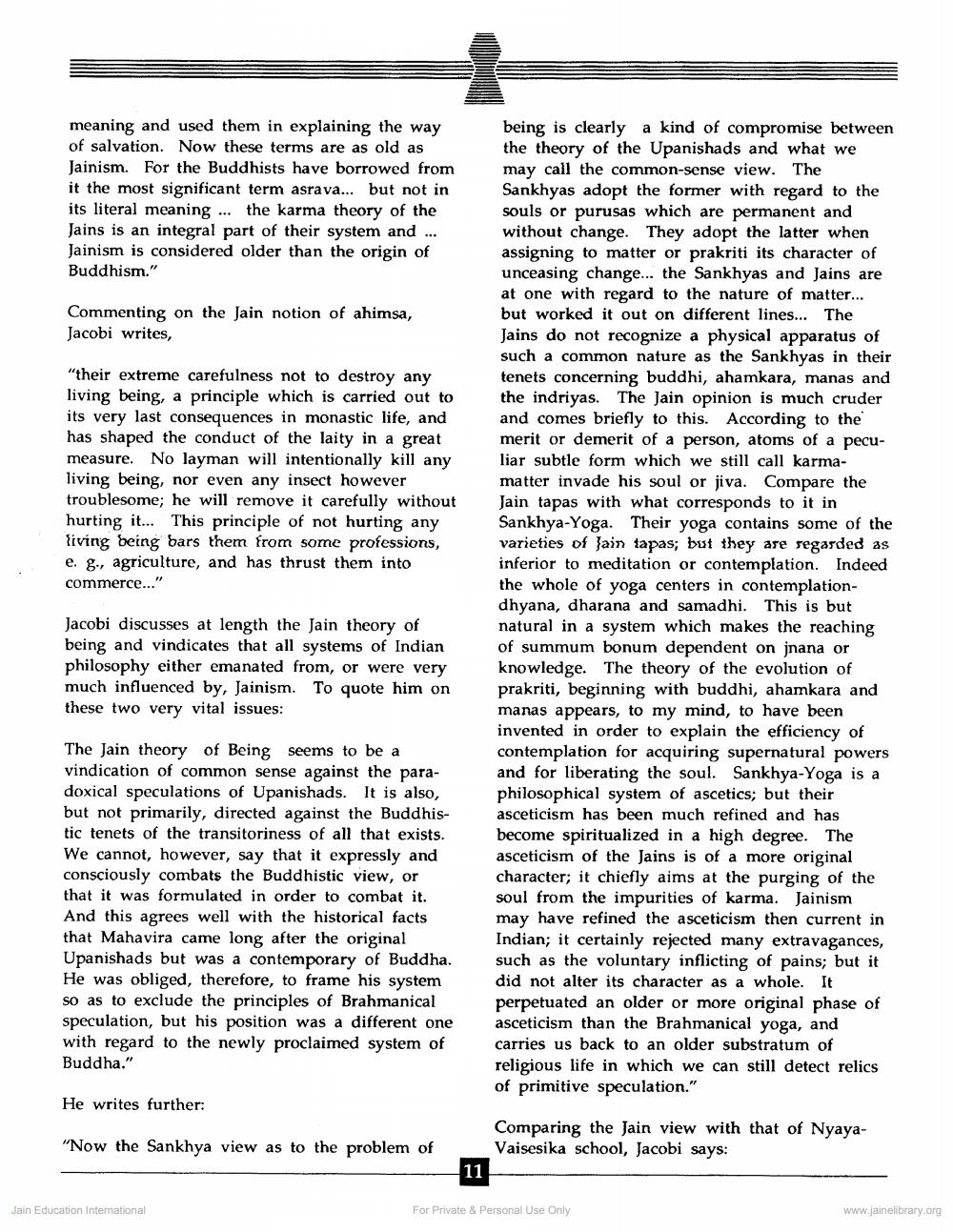________________
meaning and used them in explaining the way of salvation. Now these terms are as old as Jainism. For the Buddhists have borrowed from it the most significant term asrava... but not in its literal meaning... the karma theory of the Jains is an integral part of their system and ... Jainism is considered older than the origin of Buddhism."
Commenting on the Jain notion of ahimsa, Jacobi writes,
"their extreme carefulness not to destroy any living being, a principle which is carried out to its very last consequences in monastic life, and has shaped the conduct of the laity in a great measure. No layman will intentionally kill any living being, nor even any insect however troublesome; he will remove it carefully without hurting it... This principle of not hurting any living being bars them from some professions, e. g., agriculture, and has thrust them into commerce..."
Jacobi discusses at length the Jain theory of being and vindicates that all systems of Indian philosophy either emanated from, or were very much influenced by, Jainism. To quote him on these two very vital issues:
The Jain theory of Being seems to be a vindication of common sense against the paradoxical speculations of Upanishads. It is also, but not primarily, directed against the Buddhistic tenets of the transitoriness of all that exists. We cannot, however, say that it expressly and consciously combats the Buddhistic view, or that it was formulated in order to combat it. And this agrees well with the historical facts that Mahavira came long after the original Upanishads but was a contemporary of Buddha. He was obliged, therefore, to frame his system so as to exclude the principles of Brahmanical speculation, but his position was a different one with regard to the newly proclaimed system of Buddha."
He writes further:
"Now the Sankhya view as to the problem of
Jain Education International
11
being is clearly a kind of compromise between the theory of the Upanishads and what we may call the common-sense view. The Sankhyas adopt the former with regard to the souls or purusas which are permanent and without change. They adopt the latter when assigning to matter or prakriti its character of unceasing change... the Sankhyas and Jains are at one with regard to the nature of matter... but worked it out on different lines... The Jains do not recognize a physical apparatus of such a common nature as the Sankhyas in their tenets concerning buddhi, ahamkara, manas and the indriyas. The Jain opinion is much cruder and comes briefly to this. According to the merit or demerit of a person, atoms of a peculiar subtle form which we still call karmamatter invade his soul or jiva. Compare the Jain tapas with what corresponds to it in Sankhya-Yoga. Their yoga contains some of the varieties of Jain tapas; but they are regarded as inferior to meditation or contemplation. Indeed the whole of yoga centers in contemplationdhyana, dharana and samadhi. This is but natural in a system which makes the reaching of summum bonum dependent on jnana or knowledge. The theory of the evolution of prakriti, beginning with buddhi, ahamkara and manas appears, to my mind, to have been invented in order to explain the efficiency of contemplation for acquiring supernatural powers and for liberating the soul. Sankhya-Yoga is a philosophical system of ascetics; but their asceticism has been much refined and has become spiritualized in a high degree. The asceticism of the Jains is of a more original character; it chiefly aims at the purging of the soul from the impurities of karma. Jainism may have refined the asceticism then current in Indian; it certainly rejected many extravagances, such as the voluntary inflicting of pains; but it did not alter its character as a whole. It perpetuated an older or more original phase of asceticism than the Brahmanical yoga, and carries us back to an older substratum of religious life in which we can still detect relics of primitive speculation."
Comparing the Jain view with that of NyayaVaisesika school, Jacobi says:
For Private & Personal Use Only
www.jainelibrary.org




